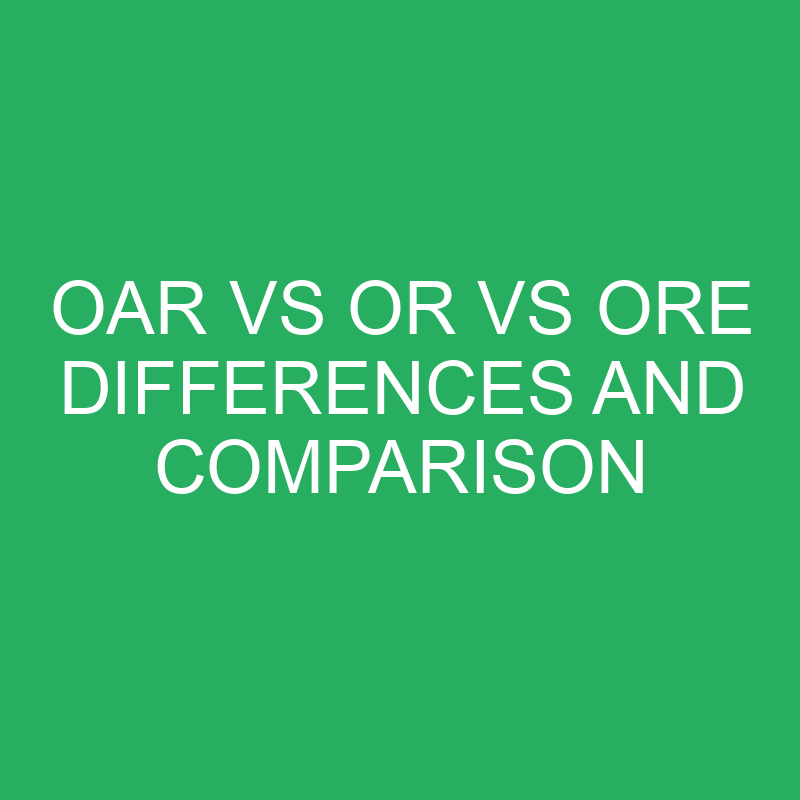“Oar,” “Or,” and “Ore” – Paddling Through Water, Considering Alternatives, and Unearthing Minerals
The English language, with its intricate nuances, introduces a trio of homophones that might appear similar in pronunciation but diverge significantly in meaning. Let’s explore the unique characteristics and usages of “oar,” “or,” and “ore.”
Post Contents
Oar – Boat Paddle:
Definition: “Oar” is a noun that refers to a long pole with a flat blade at one end, used for rowing or propelling a boat through the water.
Examples:
- The rower skillfully dipped the oar into the water, propelling the boat forward with each stroke.
- He secured the oars in the boat before setting out for an afternoon of rowing on the serene lake.
- The canoeist adjusted the angle of the oar to navigate smoothly through the river’s currents.
Usage: In maritime and recreational contexts, “oar” is an essential tool for propelling boats, canoes, or rowboats. It plays a crucial role in providing both direction and propulsion while navigating bodies of water.
Or – Otherwise:
Definition: “Or” is a conjunction used to introduce an alternative or to present a choice between two options. It signifies a distinction or a choice between alternatives.
Examples:
- Would you like tea or coffee for breakfast?
- You can choose to visit the museum or explore the botanical garden this weekend.
- The dress is available in blue or red, allowing customers to pick their preferred color.
Usage: “Or” is a versatile conjunction commonly used in everyday language to present options, alternatives, or choices. It introduces a contrast or a decision point, indicating that one of the alternatives can be chosen.
Ore – Mineral:
Definition: “Ore” is a noun that refers to a naturally occurring mineral or rock from which a valuable or useful substance, especially a metal, can be extracted. It is typically mined for its economic value.
Examples:
- The region is known for its rich deposits of iron ore, contributing significantly to the steel industry.
- Miners extracted copper ore from the mountain, processing it to obtain pure copper.
- Gold ore veins were discovered in the remote valley, sparking a rush of prospectors hoping to strike it rich.
Usage: In geological and industrial contexts, “ore” is a crucial term associated with mining and extraction processes. It represents the raw material containing valuable minerals, often leading to various industrial applications.
Homophones: The trio of “oar,” “or,” and “ore” exemplifies homophones – words that share the same pronunciation but have different meanings. Distinguishing their usage relies on context, ensuring precise communication in both written and spoken language.
Common Pitfalls and Clarifications:
- Oar vs. Or: Boat Paddle vs. Otherwise:
- Incorrect: “Would you like tea oar coffee for breakfast?”
- Correct: “Would you like tea or coffee for breakfast?”
- Or vs. Ore: Otherwise vs. Mineral:
- Incorrect: “The region is known for its rich deposits of iron or, contributing significantly to the steel industry.”
- Correct: “The region is known for its rich deposits of iron ore, contributing significantly to the steel industry.”
- Ore vs. Oar: Mineral vs. Boat Paddle:
- Incorrect: “The miners extracted copper oars from the mountain, processing them to obtain pure copper.”
- Correct: “The miners extracted copper ore from the mountain, processing it to obtain pure copper.”
Conclusion:
In the symphony of homophones, “oar,” “or,” and “ore” contribute distinct notes, each resonating in specific contexts. Whether navigating waterways with a boat paddle, presenting choices with “or,” or unearthing valuable minerals with “ore,” these homophones showcase the richness and versatility of the English language. Armed with a clear understanding of their definitions and usages, language enthusiasts can navigate diverse scenarios with precision, ensuring effective communication.
